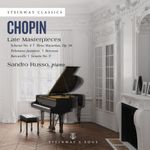|
Back
10/29/2019
“Late Masterpieces”
Frédéric Chopin: Scherzo n° 4 in E major, opus 54 – Three Mazurkas, opus 56 – Polonaise-fantasie in A-Flat major, opus 61 – Berceuse in D-Flat major, opus 57 – Barcarolle in F-Sharp major, opus 60 – Sonata n° 3 in B minor, opus 58
Sandro Russo (piano)
Recording: Patrych Sound Studio, New York City (February 11 and March 30, 2019) – 77’19
Steinway & Sons 30125 – Booklet in English

   
As was found in last years “Images et Mirages”, Sandro Russo’s style removes elements of surfeit when expressing his sensibilities of Frédéric Chopin’s late œuvres. M. Russo integrates and penetrates with pockets of moving commentaries, giving his vision a need for a careful listen even though his pianistic qualities are better-developed than others.
Overall, Sandro Russo’s senses have ‘softness around the edges’, even during more turbulent passages. Such a case can be made inside Sonata n° 3’s “Largo” while the “Finale” rounds out the jagged edges: the tension thinly surfaces with torment.
Where the Sicilian breaks out with Polish élan is during the Mazurka exercises: n° 1 in B major has more timidity and restraint, yet this approach sets up a nice contrast to the more spirited n° 3 in C major with a pleasing lilt. Pensiveness weighs highly during his closing selection, n° 3 in C minor.
During the Barcarolle Sandro Russo chooses to marinate notes more assiduously, though dramatic punctuations are a bit distant, and the pedals dampen the crests of poignant friction. Summarily, the tempo is wistfully mounted inside the Berceuse with pint-sized dosages of cascading runs.
A tantalizing rendition of the Polonaise-fantaisie houses a firm sampling of Sandro Russo’s patience to build momentum, utilizing metronomic fluidity. This piece brings the listener inside closer folds of intimacy with Chopin’s music...it tells a story with substance and emotive flavor.
The CD’s opening selection shows M. Russo giving more legato to the Scherzo which doesn’t fully match up to the composition’s expectant, playful-like qualities. The opening bars tend to muddy staccato accentuations. There is a void of stronger frivolity; therefore, the freshness is impuissant: “mulling it over” is what’s more strongly exuded, and the glance turns more to a statement of circumspection. Compared to Nikolai Lugansky’s approach, both pathways are remarkably distinct.
Sandro Russo’s technical outreaches, while commendable, relinquish a well-gelled musical corona.
Christie Grimstad
|